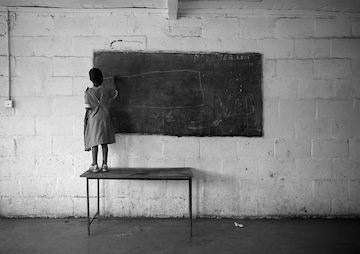If Privatizing Education Aggravates Inequality, Why Does the World Bank Support It?
Fifteen years after the international community committed itself to bringing primary education to every boy and girl, 58 million children still lack access to schools, especially in sub-Saharan Africa and South Asia. Javier Corbo (CC BY-ND 2.0)
Javier Corbo (CC BY-ND 2.0)
Fifteen years after the international community committed itself to bringing primary education to every boy and girl, 58 million children still lack access to schools, especially in sub-Saharan Africa and South Asia.
“Millions more fail to graduate, or fail to learn what they need to participate in society meaningfully,” adds Kishore Singh at The Guardian, in an article titled “Education is a basic human right — which is why private schools must be resisted.”
Singh writes:
Capitalising on the inability of governments to cope with rising demands on public learning, private education providers are mushrooming. I see this not as progress, but as an indictment of governments that have failed to meet their obligation to provide universal, free and high-quality education for all.
Education is not a privilege of the rich and well-to-do; it is the inalienable right of every child. The state must discharge its responsibility as guarantor and regulator of education as a fundamental human entitlement and as a public cause. The provision of basic education, free of cost, is not only a core obligation of states but also a moral imperative.
Privatisation cripples the notion of education as a universal human right and – by aggravating marginalisation and exclusion – runs counter to the fundamental principles of human rights law. It creates social inequity.
The admission policy in private schools is based on the ability to pay, and on the socio-economic background of parents. As a result, private schools lack the diversified system of learning and cultural plurality that is so necessary today. They promote market economy values rather than the humanist mission of education.
Disturbingly, Singh adds, international bodies that include the African Development Bank, the U.N. Economic Commission for Africa, the African Union Commission and the U.N. Development Programme have joined the World Bank in supporting for-profit education. A paper released by the African Development Bank and the U.N. groups concluded that “Africa must build a vibrant private sector that supports the development of a dynamic primary education system,” and the call has been echoed by some government officials in Africa and elsewhere.
Read more here.
— Posted by Alexander Reed Kelly.
Your support matters…Independent journalism is under threat and overshadowed by heavily funded mainstream media.
You can help level the playing field. Become a member.
Your tax-deductible contribution keeps us digging beneath the headlines to give you thought-provoking, investigative reporting and analysis that unearths what's really happening- without compromise.
Give today to support our courageous, independent journalists.






You need to be a supporter to comment.
There are currently no responses to this article.
Be the first to respond.